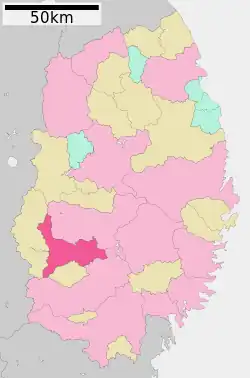Kitakami, Iwate
Kitakami (北上市, Kitakami-shi) is a city located in Iwate Prefecture, Japan. As of 1 June 2019, the city had an estimated population of 92,311, and a population density of 210 persons per km2 in 37,085 households.[1] The total area of the city is 437.55 square kilometres (168.94 sq mi).[2] The city is famous for the sakura that bloom in Tenshochi Park.
Kitakami
北上市 | |
|---|---|
 Kitakami City Hall | |
 Flag  Seal | |
 Location of Kitakami in Iwate Prefecture | |
 Kitakami | |
| Coordinates: 39°17′12.3″N 141°6′47.6″E | |
| Country | Japan |
| Region | Tōhoku |
| Prefecture | Iwate |
| Government | |
| • -Mayor | Toshihiko Takahashi (since May 2011) |
| Area | |
| • Total | 437.55 km2 (168.94 sq mi) |
| Population (February 1, 2023) | |
| • Total | 92,875 |
| • Density | 210/km2 (550/sq mi) |
| Time zone | UTC+9 (Japan Standard Time) |
| Phone number | 0197-64-2111 |
| Address | 1-1 Yoshi-cho, Kitakami-shi, Iwate-ken 024-8501 |
| Climate | Cfa |
| Website | Official website |
| Symbols | |
| Bird | Grey wagtail |
| Flower | White White lily |
| Tree | Sakura |

Geography
Kitakami is located in south-central Iwate Prefecture, in the Kitakami River valley, approximately 45 kilometers south of the prefectural capital of Morioka, and 490 kilometers north of Tokyo. The city is at the confluence of the Kitakami River and the Waga River and has an altitude ranging from 50 to 200 meters above sea level, rising to 400 meters in the east.
Climate
Kitakami has a humid climate (Köppen Cfa) characterized by mild summers and cold winters. The average annual temperature in Kitakami is 10.5 °C. The average annual rainfall is 1319 mm with September as the wettest month and February as the driest month. The temperatures are highest on average in August, at around 24.3 °C, and lowest in January, at around -2.4 °C.[3]
| Climate data for Kitakami, Iwate (1991−2020 normals, extremes 1976−present) | |||||||||||||
|---|---|---|---|---|---|---|---|---|---|---|---|---|---|
| Month | Jan | Feb | Mar | Apr | May | Jun | Jul | Aug | Sep | Oct | Nov | Dec | Year |
| Record high °C (°F) | 13.4 (56.1) |
15.4 (59.7) |
21.7 (71.1) |
28.9 (84.0) |
33.5 (92.3) |
33.8 (92.8) |
36.6 (97.9) |
37.0 (98.6) |
35.8 (96.4) |
28.4 (83.1) |
22.1 (71.8) |
18.4 (65.1) |
37.0 (98.6) |
| Average high °C (°F) | 2.4 (36.3) |
3.6 (38.5) |
8.1 (46.6) |
15.0 (59.0) |
20.8 (69.4) |
24.3 (75.7) |
27.4 (81.3) |
28.9 (84.0) |
24.8 (76.6) |
18.5 (65.3) |
11.6 (52.9) |
4.9 (40.8) |
15.9 (60.5) |
| Daily mean °C (°F) | −0.9 (30.4) |
−0.1 (31.8) |
3.4 (38.1) |
9.4 (48.9) |
15.2 (59.4) |
19.3 (66.7) |
22.9 (73.2) |
24.1 (75.4) |
20.1 (68.2) |
13.6 (56.5) |
7.1 (44.8) |
1.5 (34.7) |
11.3 (52.3) |
| Average low °C (°F) | −4.2 (24.4) |
−3.7 (25.3) |
−0.8 (30.6) |
4.2 (39.6) |
10.3 (50.5) |
15.3 (59.5) |
19.4 (66.9) |
20.5 (68.9) |
16.2 (61.2) |
9.1 (48.4) |
2.9 (37.2) |
−1.7 (28.9) |
7.3 (45.1) |
| Record low °C (°F) | −17.3 (0.9) |
−17.4 (0.7) |
−11.1 (12.0) |
−5.4 (22.3) |
−0.2 (31.6) |
6.2 (43.2) |
9.3 (48.7) |
11.8 (53.2) |
4.9 (40.8) |
−1.0 (30.2) |
−7.1 (19.2) |
−15.0 (5.0) |
−17.4 (0.7) |
| Average precipitation mm (inches) | 72.7 (2.86) |
56.3 (2.22) |
87.7 (3.45) |
86.4 (3.40) |
112.1 (4.41) |
128.1 (5.04) |
196.7 (7.74) |
165.3 (6.51) |
156.1 (6.15) |
118.2 (4.65) |
91.7 (3.61) |
91.9 (3.62) |
1,357.8 (53.46) |
| Average snowfall cm (inches) | 123 (48) |
99 (39) |
42 (17) |
2 (0.8) |
0 (0) |
0 (0) |
0 (0) |
0 (0) |
0 (0) |
0 (0) |
3 (1.2) |
73 (29) |
340 (134) |
| Average rainy days | 14.6 | 12.6 | 13.0 | 11.0 | 10.7 | 10.4 | 13.1 | 11.4 | 11.8 | 11.4 | 13.4 | 15.4 | 148.8 |
| Average snowy days | 13.8 | 12.8 | 5.2 | 0.3 | 0 | 0 | 0 | 0 | 0 | 0 | 0.3 | 7.4 | 39.8 |
| Mean monthly sunshine hours | 90.1 | 100.5 | 141.4 | 172.0 | 183.6 | 149.2 | 128.8 | 147.5 | 121.3 | 131.4 | 108.2 | 84.9 | 1,562 |
| Source 1: JMA[4] | |||||||||||||
| Source 2: JMA[5] | |||||||||||||
Demographics
Per Japanese census data,[6] the population of Kitakami has recently plateaued after several decades of growth.
| Year | Pop. | ±% |
|---|---|---|
| 1920 | 43,431 | — |
| 1930 | 47,101 | +8.5% |
| 1940 | 52,622 | +11.7% |
| 1950 | 67,097 | +27.5% |
| 1960 | 70,032 | +4.4% |
| 1970 | 68,074 | −2.8% |
| 1980 | 76,633 | +12.6% |
| 1990 | 82,902 | +8.2% |
| 2000 | 91,501 | +10.4% |
| 2010 | 93,147 | +1.8% |
| 2020 | 93,045 | −0.1% |
History
The area of present-day Kitakami was part of ancient Mutsu Province, and has been settled since at least the Jōmon period by the Emishi people. The area was a stronghold for the Emishi chieftain Aterui until his death at the hands of Sakanoue Tamuramaro. During the later portion of the Heian period, the area was ruled by the Abe clan, and became a battleground during the Former Nine Years War. The Abe were followed by the Northern Fujiwara clan. During the Sengoku period, the area came under the control of the Nanbu clan. The area was part of Morioka Domain during the Edo period, under the Tokugawa shogunate, with the exception of two villages on its southeastern border, which were under Sendai Domain.
The town of Kurosawajiri was established by the Meiji period creation of the modern municipalities system on April 1, 1891. The modern city of Kitakami was founded on April 1, 1954, by the merger of the town of Kurosawajiri, with the villages of Iitoyo, Futako, Saraki, Oniyanai, Aisari and Fukuoka. On April 1, 1991 Kitakami absorbed the neighboring village of Ezuriko and town of Waga (both from Waga District).
Government
Kitakami has a mayor-council form of government with a directly elected mayor and a unicameral city legislature of 13 members.[7] Kitakami and the town of Nishiwaga collectively contribute four seats to the Iwate Prefectural legislature. In terms of national politics, the city is part of Iwate 3rd district of the lower house of the Diet of Japan.
Economy
The economy of Kitakami was traditionally agricultural; however, due to its ease of access with Sendai and Morioka via the Tōhoku Expressway, the area has rapidly developed into a light manufacturing and transshipment center, with numerous industrial parks.
Education
Kitakami has 17 public elementary schools and nine public junior high schools operated by the city government and five public high schools operated by the Iwate Prefectural Board of Education.
Transportation
Railway
![]() East Japan Railway Company (JR East) - Tōhoku Shinkansen
East Japan Railway Company (JR East) - Tōhoku Shinkansen
![]() East Japan Railway Company (JR East) - Tōhoku Main Line
East Japan Railway Company (JR East) - Tōhoku Main Line
![]() East Japan Railway Company (JR East) - Kitakami Line
East Japan Railway Company (JR East) - Kitakami Line
- Kitakami - Yanagihara - Ezuriko - Fujine - Tatekawame -Yokokawame - Iwasawa - Wakasennin
Highway
 Tōhoku Expressway – Kitakami-Kanegasaki IC, Kitakami-Ezuriko IC
Tōhoku Expressway – Kitakami-Kanegasaki IC, Kitakami-Ezuriko IC Akita Expressway – Kitakami IC, Kitakami-Nishi IC
Akita Expressway – Kitakami IC, Kitakami-Nishi IC National Route 4
National Route 4 National Route 107
National Route 107 National Route 456
National Route 456
Local attractions
The city is famous for the sakura that bloom in Tenshochi Park, which is regarded as one of the hundred best places in Japan to view cherry blossoms.
Another hallmark of the city is Oni Kenbai, a traditional sword dance where the dancers dress as demons, performed during the summer festivals, such as Kitakami Michinoku Traditional Dance Festival.
Kitakami also boasts a site that is reputed to be the grave of the famous Heian period waka poet Izumi Shikibu.
National Historic Sites
- Kabayama Site, Jōmon period ruins[8]
- Ezuriko Kofun Cluster, Kofun period tumuli[9]
- Kunimisan temple ruins, Heian period temple ruins,[10]
- Hatten Site, Jōmon period settlement ruins[11]
- Nanbu-Date border mounds, Edo period border markers [12]
International relations
 USA – Concord, California, United States,[13] sister cities since October 25, 1974
USA – Concord, California, United States,[13] sister cities since October 25, 1974 China – Sanmenxia, Henan Province, China, friendship cities since May 25, 1985 [14]
China – Sanmenxia, Henan Province, China, friendship cities since May 25, 1985 [14]
Noted people from Kitakami
- Tamaki Saitō, psychologist
- Hiroki Suzuki, actor
- Saori Takahashi, professional women's volleyball player
- Tatsuo Hirano, politician [15]
- Yoshiaki Fujiwara, professional wrestler
- Akira Yaegashi, professional boxer
- Yoshida Tatsuya, musician
References
- Kitakami city official home page
- 詳細データ 岩手県北上市. 市町村の姿 グラフと統計でみる農林水産業 (in Japanese). Ministry of Agriculture, Forestry and Fisheries. 2016. Retrieved 13 April 2017.
- Kitakami climate data
- 観測史上1~10位の値(年間を通じての値). JMA. Retrieved February 18, 2022.
- 気象庁 / 平年値(年・月ごとの値). JMA. Retrieved February 18, 2022.
- Kitakami population statistics
- Kitakami City Council
- Agency for Cultural Affairs - Cultural Heritage Online (in Japanese)
- Agency for Cultural Affairs Online (in Japanese)
- Agency for Cultural Affairs (in Japanese)
- Agency for Cultural Affairs - Cultural Heritage Online (in Japanese)
- "南部領伊達領境塚". Cultural Heritage Online (in Japanese). Agency for Cultural Affairs. Retrieved 25 December 2016.
- "Concord's Sister City". Concord, CA: WayBack Machine. Archived from the original on 21 September 2008. Retrieved 10 December 2019.
- "Sister Cities Friendship Cities". Kitakami City official home page. 2014. Archived from the original on 12 August 2014. Retrieved 12 December 2015.
- Hirano Tatsuo official home page(in Japanese)